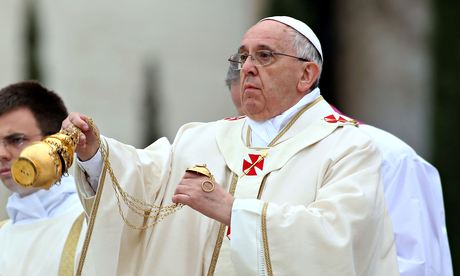In explicitly prizing human beings over markets, Francis has confirmed he is a far cry from the Reaganist Pope John Paul II he just canonised

- theguardian.com, Tuesday 29 April 2014 06.03 AEST

'Pope Francis harks back to a tradition of distrust for the market, dominant in American Christianity until Reaganism.' Photograph: Franco Origlia/Getty Images
Inequality is the root of social evil, Pope Francis has tweeted, only a day after he canonised Pope John Paul II, a man regarded by American rightwingers as the spiritual arm of Ronald Reagan. So, Saint John Paul II is now officially stowed in heaven, and his attitude to capitalism has been consigned to the attic where the Catholic church keeps its lumber of discarded opinions.
Francis has been saying things a lot like this for years, most recently last autumn. Each time, the voices of largely American conservatives explaining that he has been misunderstood get a little less self-assured. It is – even for a Republican party hack – difficult to mistake what the Pope meant, although one site has already made a heroic attempt by translating the tweet into Latin: it appears to be a denunciation of injustice rather than inequality. But in last autumn's essay, Evangelii Gaudium, Francis wrote that: "Just as the commandment 'Thou shalt not kill' sets a clear limit in order to safeguard the value of human life, today we also have to say 'Thou shalt not' to an economy of exclusion and inequality. Such an economy kills … Today everything comes under the laws of competition and the survival of the fittest, where the powerful feed upon the powerless. As a consequence, masses of people find themselves excluded and marginalised: without work, without possibilities, without any means of escape. Human beings are themselves considered consumer goods to be used and then discarded."
The claim that human beings have an intrinsic value in themselves, irrespective of their usefulness to other people, is one that unites Christianity and socialism. It can be even found somewhere in the shadows of Marxism, but there humans gain their value from history, and when they stand in its way, that's tough for them, as the millions of Stalin's victims could tell us. But if you think the market is the real world, it makes no sense at all, since in the market, value is simply the outcome of supply and demand.
The American Christian right is convinced that God so loves everyone that there is no need for anyone else to do so. Pope Francis harks back to a much earlier tradition of distrust for the market, which had been dominant in American Christianity until the rise of Reaganism. Then, a group of Catholic intellectuals, some former Protestants such as Richard John Neuhaus, reacted against the liberalism of the 1960s by proclaiming that the church was far more than social work and that only the market allowed people the moral freedom essential to the Christian vision. Equality was to these people fundamentally immoral.
In their arguments they made much of the claim that liberal churches were dying and strict ones flourishing. The claim became that middle-class, Guardian-style activist Christianity was doomed. Only an uncompromising proclamation of the great countercultural truths of Christianity could save the faith, restore civilisation and so on. Important among these great countercultural Christian principles was of course the necessity for the rich to get richer and richer.
This attack was effective partly because it was pitched in moral terms: it denied the moral superiority of the welfare state to the alternatives. What makes Pope Francis's attack so significant is that his position, too, is charged in moral terms.
What he really believes is that riches in themselves are bad for people. That is part of the reason he does not live in the papal apartments. This is not a view shared throughout the Catholic hierarchy. Nor is it really, whole-heartedly, shared by the politicians who will praise his views. I don't see any party anywhere in the world, except perhaps the Greens, running for election on the basis that they will make the voters poorer but more virtuous.
But at the very least Francis's remarks show that Christianity can be a way to step outside the rules by which we are normally bound, and consider the world as it might be if the games we all played were different and had different goals.
....
Taken from: http://www.theguardian.com/commentisfree/2014/apr/28/pope-francis-condemns-inequality-john-paul


